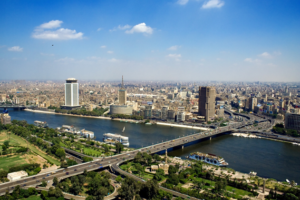E-Commerce In Cairo Is Witnessing An Exciting Wave Of Transformation, Says JLL
The global Covid-19 pandemic has resulted ina new wave of transformation in e-commerce in Cairo and across Egypt, according to JLL’s Q1 Cairo Real Estate Market Performance report.
Due to the closure of malls, the logistics landscape in Egypt is transforming. Consumers have had a taste for the efficiency associated with e-commerce, and therefore the sector is now striving to keep up with the exceptional increase in demand for online shopping.
From this, according to the report, stems the need to innovate and adopt new agile ways of working, whilst abandoning the traditional models of doing business in order to thrive. As a result, more and more retailers are examining the interplay between bricks-and mortar, as well as online retailing, in order to compete in a rapidly changing environment. This is also increasing the demand for new and better quality warehouses and distribution centres as retailers continue to grow their consumer base and promise more choice and convenience.
“E-commerce is a popular investment sector with growing interest globally,” said Ayman Sami, Country Head, JLL, Egypt. “It will need strong government support, comprising a key element of plans for the city’s continued economic growth. This will also reflect positively on the active warehousing and logistics sector in Egypt with great potential to grow.”
Despite the challenging times affecting Cairo’s real estate market, most sectors remained stable in the first quarter of 2020. The office sector in particular recorded strong performance.
Cairo’s office sector has seen a 9% increase in average prime rents on an annual basisdespite the unfavourable market conditions, due to the limited supply of high-quality offices. The average vacancy rates have also remained stable at 12% over the last quarter which also reflects an overall strong office performance in Q1 2020. Various measures that have been taken, including the ‘work from home’ initiative, will seedemand for office space likely remain subdued in the short-to-mid term, with requirements focused on smaller fitted out spaces, to minimize capital expenditures.
The retail sector in Cairo has seen positive performance during the first quarter of the year where average rental rates increased by 10% across primary and secondary malls. However, the current market conditions have suffered from the pandemic and caused an increase in downward pressure on operations and sales volumes, resulting in landlords offering rental exemptions to support tenants. This is expected to reflect even further in the second half of this year provided the temporary lockdown of all retail operations and other preventative measures remain active.
The residential sectorremains almost unchanged with limited units delivered in the first quarter of 2020 keeping the total residential units at 159,000. An additional 58,000 units areexpected to be completedby the end of 2020, but given the current market condition these are expected to spill over into 2021/2022. As there is still a large amount of future supply currently under construction in East Cairo, this hasplaced downward pressure on sale prices over this quarter while the shortage of supply in 6th of October City makes it the better performer in Q1 2020. The rental market remains landlord-favourable, as rents in both New Cairo and 6th of October City continue to witness an increase.
The hotel sector has been the most severely impacted as a result of the pandemic and this is evident especially towards the end of the first quarter with a 30% annual drop in average daily rates (ADRs) while an even sharper decline of 81% took place in occupancy rates. The hotel supply remained stable at 23,000 keys with no additional completions in the first quarter of 2020 and around 400 keys are still expected to be delivered by the end of the year.
Government initiatives are also in place to support the hospitality sector during these uncertain times with the support of the Central Bank of Egypt (CBE) allocating EGP 50 billionfor two year loans with a six month grace periodto contribute towards salaries and maintenance payments. The CBE has also recently granted hotels and tourist facilities a financing plan to support hotel development and renovation.
For more information, please find the full Q1 report attached.







